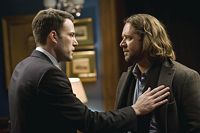A homeless man is shot to death in a dark Georgetown alley. Miles away, a beautiful young congressional staffer dies beneath the screeching wheels of a speeding subway train. Are they isolated, unrelated tragedies, or just two slivers of a massive conspiracy involving the highest echelons of government?
Congressman Stephen Collins (Ben Affleck, continuing to do a fine job redeeming himself for pretty much all of this decade’s work) is a rising star. Astute, handsome and politically connected, he is the undisputed future of his party. But when his research assistant dies under questionable circumstances and he confesses to having had an illicit affair with her, Collins’ political fortunes are called into question.

Cal McAffrey (Russell Crowe with a gut as large as his hair is long) has been around the block a few times. A seasoned, no-nonsense reporter for The Washington Globe, Cal begins investigating the shooting of a homeless purse snatcher before coming to the conclusion that his death is far from random. When the man’s murder becomes irrevocably linked to the mistress of Congressman Collins—once Cal’s college roommate and best friend—he realizes there is much more going on than meets the eye.
Trying desperately (and not always successfully) to be both friend and reporter, Cal ignores the obvious conflict of interest and enlists the help of hungry, rookie blogger Della Frye (Rachel McAdams). Together, with their battleaxe of an editor (Helen Mirren) looking on apprehensively, the two intrepid reporters begin digging into the story, frequently endangering their own lives in the process. But the problem with digging is that you often end up uncovering things that were never meant to see the light of day. And you cannot help but come away dirty.

Without comprehending the ramifications of their actions or how high the conspiracy goes, Cal and Della stumble onto a titanic cover-up involving a defense department contract worth billions of dollars. PointCorp, a defense contractor which, we are told, represents nothing less than “the privatization of Homeland Security,” stands in for real-life disgraced mercenary outfits like Blackwater (with a bit of Halliburton thrown in for good measure). Yesterday’s outlandish is today’s completely believable. And when that much money is at stake (one informant calls it “wrath of God money”), there isn’t anything some people won’t do to protect it.
Director Kevin McDonald (The Last King of Scotland) has crafted a taut, knotty, pulse-pounding political thriller that gushes with the reflected glory of classic films like All the President’s Men. Which is a bit of a pleasant surprise given the fact that State of Play is an abridged adaptation of a British television miniseries that set the action among Parliament and the fabled Fleet Street presses.
The credit for condensing what was considered an impossible adaptation clearly belongs to screenwriters Matthew Michael Carnahan (Lions for Lambs, The Kingdom) and Tony Gilroy (Michael Clayton, Duplicity, the Bourne trilogy). Gilroy’s fingerprints especially are all over the narrative, which is complicated without being gratuitously bewildering. There comes a point at which you stop trying to figure it all out, confident you’re already too many steps behind the script (there’s a delightful change), and just allow yourself to unravel the mystery at the film’s pace. As layer upon layer of the story is peeled back, the complexity grows, rather than recedes. Truth is never what it appears to be. This is the sort of film in which you’re looking for the next twist right up to the point that the credits begin to roll.

State of Play is actually two movies, working as one. In the first, tireless reporters investigate a murder cover-up, and in the second, those same reporters are themselves the story, cogs in the wheels of a once-great machine grinding to a calamitous halt. The government isn’t the only entity being subsumed by monopolizing private interests. Cal and Della’s Washington Globe (clearly based on a Washington Post that’s gone a bit ratty at the edges) has just been bought by a media conglomerate more interested in sexy scoop stories than real journalism. Mirren’s editor character is constantly under pressure to produce a story even before it has fully gestated into fact. We bear witness to the final, agonizing gasps of the newspaper industry, and while the film seems to suggest that good, old-fashioned investigative work (coupled, of course, with a close working relationship between traditional reporters and modern bloggers) is the answer, we get the sense that the writing, as it were, is already on the wall.
State of Play‘s cast is simply amazing. Every scene change is an invitation for yet another famous face to waltz on screen. This is the sort of film in which even Oscar nominees get bit parts. In addition to the aforementioned leads, Robin Wright Penn plays Congressman Collins’ cuckolded wife, Jason Bateman is a smarmy PR man, Jeff Daniels is the majority whip, Harry Lennix is a beleaguered D.C. detective (the tug-of-war between law enforcement and the press is yet another of the film’s sub-themes), and Viola Davis, one of last year’s Academy Award nominees for Best Supporting Actress, gets a handful of throwaway lines as a forensic pathologist.

State of Play is perhaps the most cinematic love letter to the nation’s capitol ever made. That said, McDonald’s camera never shows off. There are no grand aerial establishing shots, gliding over the National Mall and settling on the Capitol building, as we are so used to seeing in thrillers such as this. While landmarks certainly find their way into McDonald’s frame, he never flaunts his location. Rather, they are incidental, unobtrusive glimpses of the sort of iconic structures most Americans spend long vacations visiting, but which the city’s residents (of which I am one) walk past daily without a second thought. State of Play captures D.C.’s memorials and sooty back alleys, the working man’s Washington as well as the one famous for its gilded monuments. Furthermore, McDonald is not afraid to shoot the city in unflattering angles, drenched in omnipresent rain, giving the film an uncomfortably soggy feel, the sort of dampness and cold that gets into your bones and won’t get out. In State of Play, even the weather is a metaphor.
State of Play hangs around for a bit too long. There is the feeling that a bit less convoluted intricacy and a teeny bit better pacing would have helped the story along. But better pacing could not have rescued the film from a conclusion that, while thrilling, is still a bit disappointing. It doesn’t ruin the film by any means, but it feels somewhat anti-climactic, rushed, unresolved and not entirely up par with the vigor and poise of what came before it. The denouncement comes with a twist that feels less organic than it should, like it was inserted for the twist’s sake, rather than because it was the natural outgrowth of the narrative.
While State of Play doesn’t work all the time, it never fails to entertain and engage. Even as it depicts a world rendered quaint and anachronistic by the exponentially explosive growth of mass media technology, the film retains palpable substance and relevance. And that pride you feel watching reporters dig for the truth and not come up for air until they find it is real too.
Talk About It
Discussion starters- Characters are never shown engaging in infidelity, but the repercussions of their actions are clear. Do you think the film shows the consequences of their extramarital affairs honestly?
- As a reporter, Cal must maintain objectivity, but he’s also human and wants to help a friend in need. Have you ever faced a similar conflict? How did you solve it?
- Cal and Della find their integrity challenged often, especially when they discover very sensitive information. Is it possible to maintain your honor even when your job brings you into contact with so many unsavory people? How?
- How do you see the role of the press in modern America? Are newspapers still conduits by which the public speaks truth to power, or are they relics of a bygone era? And if newspapers will soon be extinct, what are we losing?
The Family Corner
For parents to considerState of Play is rated PG-13 for some violence, language including sexual references, and brief drug content. The violence is quick and not very graphic. The language is surprisingly mild (though there are numerous discussions about infidelity and its heartbreaking consequences). Sexual situations are not shown, only discussed. Whiskey flows freely and during one very brief sequence, drugs can be seen.
Photos © Copyright Universal Pictures
Copyright © 2009 Christianity Today. Click for reprint information.












